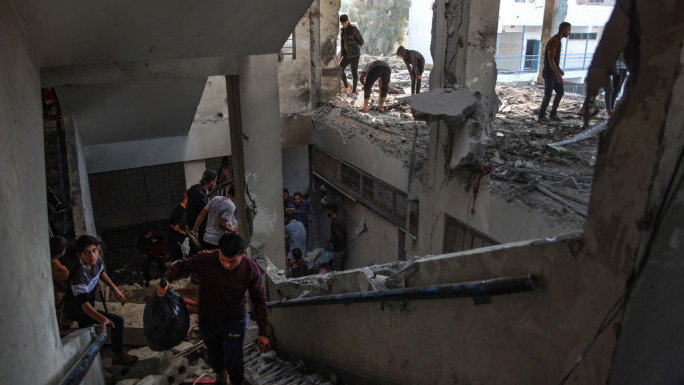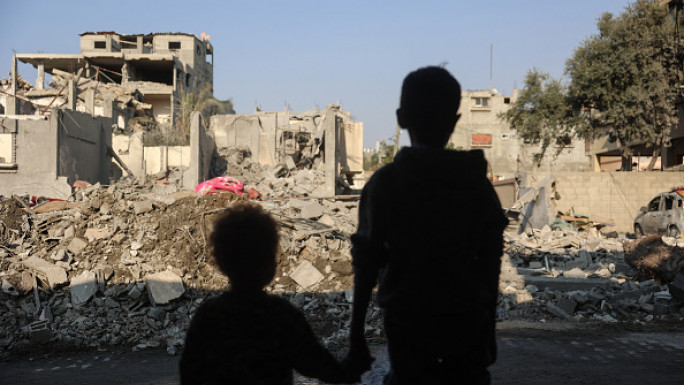Houthis 'disappearing’ political opponents in Yemen
Houthis 'disappearing’ political opponents in Yemen
Analysis: The location of Muhammad Qahtan, the leader of the Islah party, is unknown five months after his arrest.
2 min read
The Islah party endorsed Saudi-led coalition airstrikes against the Houthis in April [Anadolu]
The Houthis should provide information immediately about the detention of a prominent Yemeni opposition party member Human Rights Watch said yesterday.
Mohammed Qahtan, the 57-year-old leader of the Islah party was arrested on April 4, and his family have not been informed about where he is being held or on what grounds he is being detained.
HRW called for him to either be released or charged with a credible criminal offence.
"The Houthis have made a habit of 'disappearing' people they deem objectionable," said Joe Stork, HRW's deputy Middle East director.
"Houthi authorities are responsible for Qahtan's well-being, and should make sure his family has access to him."
Abd al-Rahman Qahtan, Qahtan's 28-year-old son said his father was placed under house arrest on March 31 by a group of a dozen uniformed Special Security Forces members who visited his house in the capital, Sanaa.
They did not justify the order or say under whose authority they were imposing it.
Two pickup trucks and a dozen armed officers stayed outside his home for four days to enforce the order.
On April 4 at 1:30pm, Qahtan's son saw three civilian cars pull up and 15 gunmen in civilian clothes get out and walk past the Special Security Forces, who did not stop them, he told HRW.
The opposition leader agreed to leave with the men after they threatened to take him by force if he refused.
Qahtan's son said he visited his father four days later, in a house occupied by the Houthis. At the time, Qahtan appeared convinced he would be released within a few days.
The family received informal messages that Qahtan was well until August, but have heard nothing since.
Reportedly more than 100 Islah party members have been detained without charge since the party endorsed Saudi-led coalition airstrikes against the Houthis that began on 26 March.
According to HRW, international law defines enforced disappearance as being "when the authorities take someone into custody and then deny holding them or fail to disclose their fate or whereabouts".
HRW argues that "disappeared" people are often at high risk of torture, especially when they are detained outside of formal detention facilities such as police jails or prisons.
"The Houthis should release all those they have wrongfully detained and compensate the victims for the hardship they have caused," said Stork.
Mohammed Qahtan, the 57-year-old leader of the Islah party was arrested on April 4, and his family have not been informed about where he is being held or on what grounds he is being detained.
HRW called for him to either be released or charged with a credible criminal offence.
"The Houthis have made a habit of 'disappearing' people they deem objectionable," said Joe Stork, HRW's deputy Middle East director.
"Houthi authorities are responsible for Qahtan's well-being, and should make sure his family has access to him."
| The opposition leader agreed to leave with the men after they threatened to take him by force if he refused |
Abd al-Rahman Qahtan, Qahtan's 28-year-old son said his father was placed under house arrest on March 31 by a group of a dozen uniformed Special Security Forces members who visited his house in the capital, Sanaa.
They did not justify the order or say under whose authority they were imposing it.
Two pickup trucks and a dozen armed officers stayed outside his home for four days to enforce the order.
On April 4 at 1:30pm, Qahtan's son saw three civilian cars pull up and 15 gunmen in civilian clothes get out and walk past the Special Security Forces, who did not stop them, he told HRW.
The opposition leader agreed to leave with the men after they threatened to take him by force if he refused.
Qahtan's son said he visited his father four days later, in a house occupied by the Houthis. At the time, Qahtan appeared convinced he would be released within a few days.
The family received informal messages that Qahtan was well until August, but have heard nothing since.
Reportedly more than 100 Islah party members have been detained without charge since the party endorsed Saudi-led coalition airstrikes against the Houthis that began on 26 March.
According to HRW, international law defines enforced disappearance as being "when the authorities take someone into custody and then deny holding them or fail to disclose their fate or whereabouts".
HRW argues that "disappeared" people are often at high risk of torture, especially when they are detained outside of formal detention facilities such as police jails or prisons.
"The Houthis should release all those they have wrongfully detained and compensate the victims for the hardship they have caused," said Stork.


![President Pezeshkian has denounced Israel's attacks on Lebanon [Getty]](/sites/default/files/styles/image_684x385/public/2173482924.jpeg?h=a5f2f23a&itok=q3evVtko)



 Follow the Middle East's top stories in English at The New Arab on Google News
Follow the Middle East's top stories in English at The New Arab on Google News


